Undeterred by heavy rain, hundreds of thousands of protesters yesterday marched in Taipei and other cities in Taiwan in support of the pro-democracy protests in Hong Kong.
Organizers said that the Hong Kong government should respond positively to the five demands made by the Hong Kong protesters, which they said are reasonable under the framework of the Basic Law of the Hong Kong Special Administrative Region.
Hong Kong Chief Executive Carrie Lam (林鄭月娥) has only agreed to withdraw the Fugitive Offenders and Mutual Legal Assistance in Criminal Matters Legislation Amendment, which ignited the months-long protests.
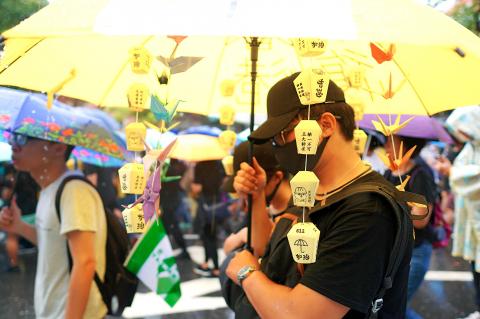
Photo: Tu Chu-min, Taipei Times
However, she has declined to form an independent committee to investigate alleged abuse of power by police; roll back the categorization of the protests after June 12 as a riot; release all student protesters and dismiss their charges; or allow universal suffrage.
Organizers said they opposed a peace treaty compiled under the “one China” framework.
The Hong Kong government should not restrict students studying in Taiwan and release the student protesters, they said.
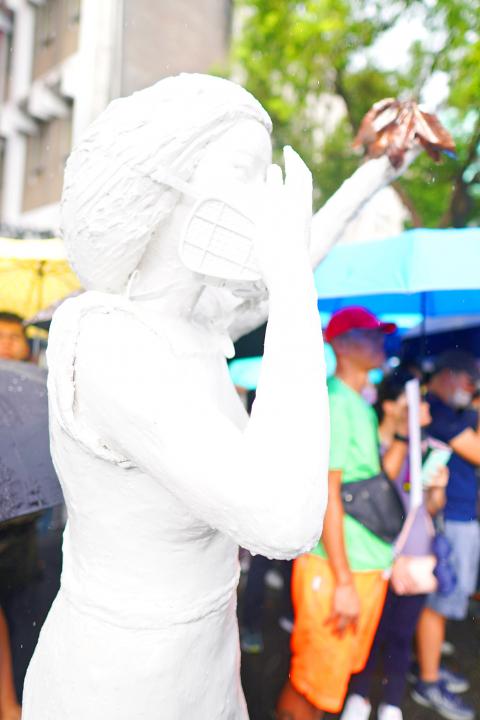
Photo: Tu Chu-min, Taipei Times
The Taiwanese government should pass legislation to protect asylum seekers from Hong Kong and Macau, they added.
A fruit vendor surnamed Chou (周) and his wife brought 10,000 dragon fruits from his farm in Changhua County’s Erlin (二林) and handed them out to protesters in Taipei for free.
“This is such a meaningful event. Supporting Hong Kong is supporting Taiwan,” Chou’s wife said.
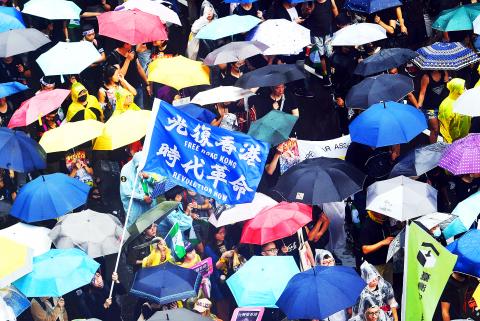
Photo: CNA
A protester surnamed Chu (朱) said that he started paying attention to the issues in Hong Kong during the 2014 “Umbrella movement,” adding that people should not harbor any dreams of “one country, two systems.”
They should look at how the Chinese Communist Party treats minorities in Tibet and Xinjiang, Chu said.
“I came here to march for freedom, which is a universal value,” he said, adding that what happened in Hong Kong made him rethink Taiwan’s relations with China.
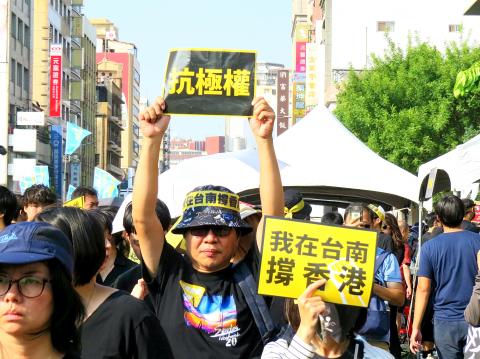
Photo: Tsai Wen-chu, Taipei Times
Among the participants were Taiwan New Constitution Foundation founder Koo Kwang-ming (辜寬敏), former premier Yu Shyi-kun (游錫堃) and Democratic Progressive Party Chairman Cho Jung-tai (卓榮泰).
Similar rallies were also held in Hsinchu, Taichung, Tainan and Kaohsiung.
While the march in Taipei proceeded peacefully in general, two Chinese Unification Promotion Party members, allegedly disguised as protesters, splashed red paint on Hong Kong singer and democracy advocate Denise Ho’s (何韻詩) head while she was being interviewed by Taiwanese media.
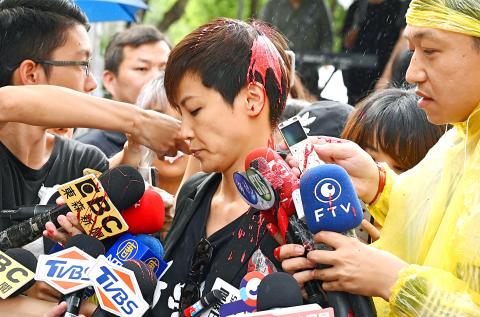
Photo: AFP / Sam Yeh
Appearing unperturbed by the incident, Ho said this showed how low pro-Beijing people can go when it comes to such issues, adding that this is the type of threat facing social advocates in Hong Kong every day.
People in Hong Kong would not be threatened, nor would they bow to oppression from China because of this incident, she said, adding that she would sue the perpetrators.
Minister of the Interior Hsu Kuo-yung (徐國勇) said police have arrested two suspects on charges of engaging in organized crime, offenses against freedom and insulting a person in public.
President Tsai Ing-wen (蔡英文) said the matter would be taken seriously, adding that people can have different opinions about a certain issue in a democratic society, but the nation would not allow such behavior to challenge its democracy.

The CIA has a message for Chinese government officials worried about their place in Chinese President Xi Jinping’s (習近平) government: Come work with us. The agency released two Mandarin-language videos on social media on Thursday inviting disgruntled officials to contact the CIA. The recruitment videos posted on YouTube and X racked up more than 5 million views combined in their first day. The outreach comes as CIA Director John Ratcliffe has vowed to boost the agency’s use of intelligence from human sources and its focus on China, which has recently targeted US officials with its own espionage operations. The videos are “aimed at

STEADFAST FRIEND: The bills encourage increased Taiwan-US engagement and address China’s distortion of UN Resolution 2758 to isolate Taiwan internationally The Presidential Office yesterday thanked the US House of Representatives for unanimously passing two Taiwan-related bills highlighting its solid support for Taiwan’s democracy and global participation, and for deepening bilateral relations. One of the bills, the Taiwan Assurance Implementation Act, requires the US Department of State to periodically review its guidelines for engagement with Taiwan, and report to the US Congress on the guidelines and plans to lift self-imposed limitations on US-Taiwan engagement. The other bill is the Taiwan International Solidarity Act, which clarifies that UN Resolution 2758 does not address the issue of the representation of Taiwan or its people in

US Indo-Pacific Commander Admiral Samuel Paparo on Friday expressed concern over the rate at which China is diversifying its military exercises, the Financial Times (FT) reported on Saturday. “The rates of change on the depth and breadth of their exercises is the one non-linear effect that I’ve seen in the last year that wakes me up at night or keeps me up at night,” Paparo was quoted by FT as saying while attending the annual Sedona Forum at the McCain Institute in Arizona. Paparo also expressed concern over the speed with which China was expanding its military. While the US

SHIFT: Taiwan’s better-than-expected first-quarter GDP and signs of weakness in the US have driven global capital back to emerging markets, the central bank head said The central bank yesterday blamed market speculation for the steep rise in the local currency, and urged exporters and financial institutions to stay calm and stop panic sell-offs to avoid hurting their own profitability. The nation’s top monetary policymaker said that it would step in, if necessary, to maintain order and stability in the foreign exchange market. The remarks came as the NT dollar yesterday closed up NT$0.919 to NT$30.145 against the US dollar in Taipei trading, after rising as high as NT$29.59 in intraday trading. The local currency has surged 5.85 percent against the greenback over the past two sessions, central